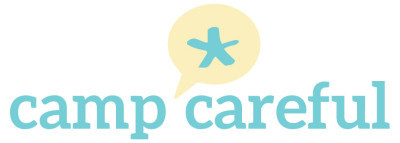Two’s company, three’s a crowd?

Three’s Company ABC Photo Archives
There’s that saying: “Two’s company, three’s a crowd.” Well, in my line of work in child sexual abuse, I say “Three’s Company”, just like in that great 70s show with Jack, Chrissy, and Janet. (Does that tell you how old I am? Please tell me I’m not the only generation on Facebook that still remembers that show!)
If you’ve ever come to my Camp Careful talks for the older kids (7-14 years old), I give a list of rules to remember for kids when they are at camps/after school activities/school/etc. to protect themselves against potential abuse situations.
My 5 rules to remember:
- Do not go alone with another camper/counselor/coach/student/friend where others can’t see you.
- Private zone is off limits and to be kept to yourself. People should not look at or touch other people’s privates.
- No sharing beds or sleeping bags. (sleepovers are fine—this more pertains to camp situations)
- No kisses or private hugs.
- No forever secrets.
I tell parents to go over these rules prior to sending a child to day camp or summer camp or after school activities. However, I try to tell these older kids the most important rule to remember is RULE #1. Never go alone with another person where others can’t see you. Rule #2 is obviously just as important, but hopefully parents are continuously reminding their kids about this one. Kids in this age group already know Rule #2, especially if they’ve been to my Camp Careful class. Rule #1 is not as intuitive, but it’s the one that will keep them out of harm’s way!
More than 80% of sexual abuse incidents happen in isolated, one-on-one situations with a child.1
One of the best ways to avoid child sexual abuse is to limit the number of opportunities a molester or perpetrator has access to your child in a private setting. Let’s go over this in two situations.
1). The adult perpetrator—this may be a coach, teacher, camp counselor, camp director, uncle, grandfather, stepmother, family friend, or neighbor. Remember, 90% of children who are sexually abused know their abuser (30% are family members, 60% are people you trust). If your child goes to camps or after-school activities, make sure your child stays with a group or in a setting that is observable by others. Be suspicious if an adult wants to have special one-on-one time with your child. This may be in the form of extra lessons, tutoring sessions, special trips or outings, etc. They may also try to isolate your child emotionally—that is, giving them special attention or love that they may be lacking at home. These are just a few of the techniques known as “grooming” that allows a sexual predator to gain trust and access to a child prior to abuse. Check out any activity or camp prior to your child’s enrollment and make sure there are always multiple spectators, adults, and children around at all times. If your child has been alone with an adult for a period of time (family members included), always check in afterward and ask your kid if everything went okay. Ask if everything was “happy”!
2). The child perpetrator—this may be an older youth (including cousins/siblings) or even a school-aged friend of your child. 40% of children are abused by older or larger youth.1 Over the years, I’ve heard numerous stories of young children who have been molested by older teenaged family members. I’ve heard stories of young toddlers who have been fondled by children at school. I’ve heard stories of young children who have been touched inappropriately by their best friends. These situations happen everywhere—at school, at family reunions, at sleepovers, on the playground, at camp. Many times, the situation can be attributed to normal healthy sexual development (curiosity and exploration can be normal, especially in the toddler and early childhood years). Sometimes, however, the perpetrating child will tell the friend that it is a “game” they learned from an adult or that it was something they learned from their older neighbor. Sadly, a child fondling another child may be a sign of a previous inappropriate sexual encounter. If your child has a friend over for a playdate or sleepover, make sure the doors are opened and you are able to watch their activities. Pop in unexpectedly and keep an eye on them. Pay attention if your teenage son’s friend wanders off to hang out with your 3 year old. Don’t let them hang out at the creek behind your house with just 2 of them. Do not be frightened or paranoid; be alert and aware!
Also, for those of you who coach little kids or have situations where you will be in charge of children, protect yourself as well! Make sure you are always with several kids and/or another adult when a child is in your care. Do not put yourself in a situation where your intentions will be questioned.
**Keep your child safe by limiting the opportunities where inappropriate sexual contact might happen. Limit the times your child is alone with just one other person. Keep talking to your children openly and frequently about keeping their private parts private–this foundation must be strong and established early in childhood! To help you do this, watch for upcoming Camp Careful classes and sign up for the newsletter at www.campcareful.com.
Trust me when I tell you these situations will happen to somebody you know: your own family member, your friend’s child, your neighbor, or your child’s classmate. They might not be talking about and might not know what to do. Please share this blog to help that somebody!
Empower your kids and stay safe!
Soo Battle, M.D., F.A.A.P.
Disclaimer: The information contained on this website/blog is for informational purposes only and should not be used to replace the relationship that exists between you and your pediatrician or doctor. Please contact your doctor for medical advice and/or treatment recommendations specific to your child.
REFERENCE: 1. Darkness to Light, 5 Steps to Protecting our Children. www.d2l.org
